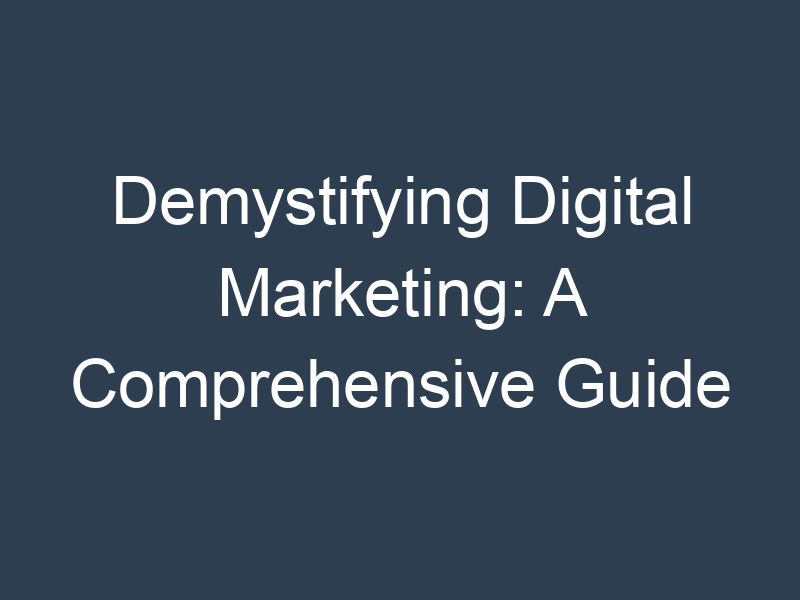Demystifying Digital Marketing: A Comprehensive Guide
In today’s fast-paced digital age, the term “digital marketing” has become ubiquitous. It’s a buzzword that every business owner, marketer, and entrepreneur needs to understand to stay competitive. But what exactly is digital marketing, and why is it crucial in the modern business landscape? In this comprehensive guide, we’ll break down the basics of digital marketing, its key components, and its significance in reaching and engaging audiences in the digital era.
What is Digital Marketing?
Digital marketing is a broad term that encompasses all marketing efforts carried out through digital channels and technologies. Unlike traditional marketing, which relies on physical media like billboards, print ads, or direct mail, digital marketing leverages the vast digital landscape to connect with and influence consumers. Its primary goal is to promote products, services, or brands, drive engagement, and ultimately, generate leads or sales.
Key Components of Digital Marketing
Search Engine Optimization (SEO): SEO is the art and science of optimizing your online content to improve its visibility in search engine results. The goal is to rank higher in organic (non-paid) search results, making it easier for potential customers to find your website.
Content Marketing: Content marketing involves creating and distributing valuable and relevant content to attract and engage a target audience. Content can take various forms, including blog posts, articles, videos, infographics, and more.
Social Media Marketing: Social media platforms like Facebook, Instagram, Twitter, LinkedIn, and others offer powerful tools for connecting with your audience, sharing content, and running targeted advertising campaigns.
Email Marketing: Email marketing involves sending targeted messages, newsletters, and promotional emails to a list of subscribers. It’s an effective way to nurture leads, build customer relationships, and promote products or services.
Pay-Per-Click (PPC) Advertising: PPC advertising allows you to display ads on search engines and other digital platforms. Advertisers pay a fee each time a user clicks on their ad. It’s a cost-effective way to drive traffic and conversions.
Affiliate Marketing: In affiliate marketing, businesses partner with affiliates or influencers who promote their products or services in exchange for a commission on sales or leads generated through their marketing efforts.
Online Public Relations (PR): Online PR involves managing your online reputation and public image through strategies like online press releases, influencer collaborations, and online reviews.
Why Digital Marketing Matters
Global Reach: Digital marketing breaks down geographical barriers, allowing businesses to reach a global audience. This provides unprecedented opportunities to expand into new markets and connect with diverse customer bases.
Measurable Results: Unlike traditional marketing, digital marketing offers precise measurement tools. You can track every click, view, conversion, and engagement, allowing you to analyze campaigns’ performance and adjust strategies accordingly.
Cost-Effective: Digital marketing often requires lower upfront costs compared to traditional marketing channels. Businesses can allocate their budgets more efficiently by targeting specific demographics and adjusting ad spend as needed.
Personalization: Digital marketing enables businesses to tailor their messages and offers to individual preferences, which fosters stronger customer relationships and increases the likelihood of conversions.
Competitive Advantage: In the digital age, businesses that embrace digital marketing gain a significant competitive edge. Those who fail to adapt may struggle to keep up with changing consumer behavior and expectations.
Conclusion
Digital marketing is not just a trend; it’s a fundamental shift in the way businesses connect with their target audiences. By understanding its key components and harnessing its power, businesses can effectively promote their products or services, engage with customers on a personal level, and achieve their marketing goals in the digital era. As technology continues to evolve, digital marketing will remain a cornerstone of modern business strategy, driving growth and success for those who embrace its potential.







